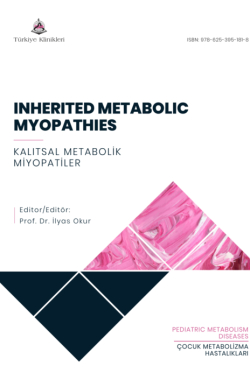Algoritms Used in Diagnosis and Treatment
Ayşe Nur ALTUNa , İlyas OKURa
aGazi Üniversitesi Faculty of Medicine, Department of Pediatric Metabolism Diseases Ankara, Türkiye
Altun AN, Okur İ. Algoritms used in diagnosis and treatment. Okur İ, editor. Inherited Metabolic Myopathies. 1st ed. Ankara: Türkiye Klinikleri; 2024. p.109-14.
ABSTRACT
Metabolic myopathies are a group of inherited metabolic diseases with muscle involvement that occur as a result of the effects of different metabolic pathways. The disease occurs due to mitochondrial metabolism disorders in which the glycogenolysis/glycolytic pathway, lipid and energy production are primarily affected. In this group, although skeletal muscle involvement is the clinical feature, hypoglycemia, cardiac muscle involvement and multisystem findings can be observed. Skeletal muscle involvement may occur with acute exercise intolerance, rhabdomyolysis attacks, or may progress with progressive muscle weakness. For diagnosis, enzyme analysis and molecular tests are performed if the detailed history of the symptoms and specific biochemical and histochemical tests can be performed. In treatment; There are options such as exercise and diet regulation, avoiding stressful situations, cofactors that will increase the activity of enzymes in the pathway, enzyme therapy and gene therapies that are at working level. It is important to make early diagnosis and start treatment in order to improve the quality of life of patients.
Keywords: Metabolic myopathies; carbohydrate; lipid; energy metabolism; lipid metabolism disorders; carbohydrate metabolism; mitochondrial myopathies; muscular diseases
Kaynak Göster
Referanslar
- Bhai SF, Vissing J. Diagnosis and management of metabolic myopathies. Muscle & Nerve. 2023;68:250-6. [Crossref] [PubMed]
- Adler M, Shieh PB. Metabolic Myopathies. Semin Neurol. 2015;35:385-97. [Crossref] [PubMed]
- Berardo A, DiMAuro S, Hirano M. A Diagnostic Algorithm for Metabolic Myopathies. Curr Neurol Neurosci Rep. 2010;10:118-26. [Crossref] [PubMed] [PMC]
- Lilleker JB, Keh YS, Roncaroli F, Sharma R, Roberts M. Metabolic myopathies: a practical approach. Pract Neurol. 2018;18(1):14-26. [Crossref] [PubMed]
- Okur I, Eminoglu FT. Kalıtsal Metabolik Miyopatiler. Turkiye Klinikleri J Pediatr. 2009;18(2):95-104.
- Darras BT, Friedman NR. Metabolic myopathies: a clinical approach; part I. Pediatr Neurol. 2000;22(2):87-97. [Crossref] [PubMed]
- Morris AAM, Spiekerkoetter U. Disorders of Mitochondrial Fatty Acid Oxidation & Riboflavin Metabolism. In: Saudubray JM, Baumgartner MR, García-Cazorla Á, Walter J, eds. Inborn Metabolic Diseases. 7th ed. Berlin: Springer; 2022. p.288-301. [Crossref]
- Toscano A, Barca E, Musumeci O. Update on diagnostics of metabolic myopathies. Curr Opin Neurol. 2017;30(5):553-62. [Crossref] [PubMed]
- Tarnopolsky MA. Metabolic Myopathies. Continuum (Minneap Minn) 2022;28(6, Muscle And Neuromuscular Junction Disorders):1752-77. [Crossref] [PubMed]
- Spiekerkoetter U, Vockley J. Mitochondrial Fatty Acid Oxidation Disorders. In: Blau N, Dionisi Vici C, Ferreira CR, Vianey-Saban C, van Karnebeek CDM, eds. Physician's Guide to the Diagnosis, Treatment, and Follow-Up of Inherited Metabolic Diseases. 2nd ed. Cham: Springer; 2022. p.930-57.
- Ahmed ST, Craven L, Russell Om, Turnbull DM, Vincent AE. Diagnosis and Treatment of Mitochondrial Myopathies. Neurotherapeutics. 2018;15:943-53. [Crossref] [PubMed] [PMC]
- Moraes CT, Ricci E, Bonilla E, DiMauro S, Schon EA. The mitochondrial tRNA(Leu(UUR)) mutation in mitochondrial encephalomyopathy, lactic acidosis, and strokelike episodes (MELAS): genetic, biochemical, and morphological correlations in skeletal muscle. Am J Hum Genet. 1992;50(5):934-49.
- Bua E, Johnson J, Herbst A, Delong B, McKenzie D, Salamat S, et al. Mitochondrial DNA-Deletion Mutations Accumulate Intracellularly to Detrimental Levels in Aged Human Skeletal Muscle Fibers. Am J Hum Genet. 2006;79(3):469-80. [Crossref] [PubMed] [PMC]
- Cohen BH. Mitochondrial and Metabolic Myopathies. Continuum (Minneap Mınn) 2019;25(6, Muscle And Neuromuscular Junction Disorders):1732-66. [Crossref] [PubMed]
- Morovat A, Weerasinghe G, Nesbitt V, Hofer M, Agnew T, Quaghebeur G, et al. Use of FGF-21 as a Biomarker of Mitochondrial Disease in Clinical Practice. J Clin Med. 2017;6(8):80. [Crossref] [PubMed] [PMC]
- Yatsuga S, Fujita Y, Ishii A, Fukumoto Y, Arahata H, Kakuma T, et al. Growth differentiation factor 15 as a useful biomarker for mitochondrial disorders. Ann Neurol. 2015;78(5):814-23. [Crossref] [PubMed] [PMC]
- Vorgerd M, Grehl T, Jager M, Muller K, Freitag G, Patzold T, et al. Creatine therapy in myophosphorylase deficiency (McArdle disease): a placebo-controlled crossover trial. Arch Neurol. 2000;57(7):956-63. [Crossref] [PubMed]
- Sato S, Ohi T, Nishino I, Sugie H. Confirmation of the efficacy of vitamin B6 supplementation for McArdle disease by follow-up muscle biopsy. Muscle Nerve. 2012;45(3):436-40. [Crossref] [PubMed]
- Orngreen MC, Ejstrup R, Vissing J. Effect of diet on exercise tolerance in carnitine palmitoyltransferase II deficiency. Neurology. 2003;61:559-61. [Crossref] [PubMed]
- Madsen KL, Preisler N, Rasmussen J, Hedermann G, Olesen JH, Lund AM, et al. L-carnitine improves skele- tal muscle fat oxidation in primary carnitine deficiency. J Clin Endocri- nol Metabol. 2018;103:4580-8. [Crossref] [PubMed]
- Vockley J, Burton B, Berry G, et al. Effects of triheptanoin (UX007) in patients with long-chain fatty acid oxidation disorders: results from an open label, long-term extension study. J Inher Metab Dis. 2021;44:253-63. [Crossref] [PubMed] [PMC]
- Barcelos I, Shadiack E, Ganetzky RD, Falk MJ. Mitochondrial medicine therapies: rationale, evidence, and dosing guidelines. Curr Opin Pediatr. 2020;32:707-18. [Crossref] [PubMed] [PMC]

